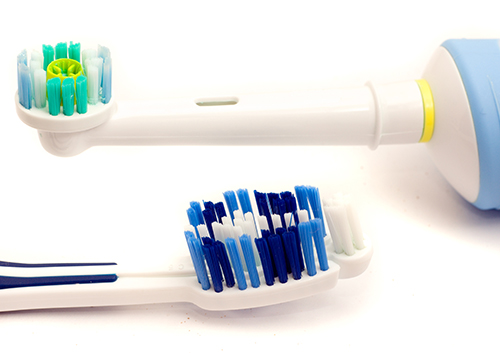Electric or Manual Toothbrush: Why It Does (and Doesn't) Matter
June 22nd, 2023

You live in the golden age of toothbrushes. Until a few decades people used twigs or brushes made from animal hair to clean their teeth: not very soft and none too effective.
Now, you have a choice of manual brushes with soft, medium, or hard bristles. Or you might choose to go with an electric toothbrush instead.
Have you ever wondered whether manual or electric brushes provide better cleaning? Actually, they both do the job. The key is to brush and floss every day, regardless of the kind of brush you prefer.
At our Fairview Heights, IL office, we like to say the best brush is the one you'll use. So if you prefer manual, go for it. If you prefer electric, turn it on.
Both types have their advantages but both types will get the job done as far as removing plaque.
Electric Toothbrushes
- Provide power rotation that helps loosen plaque
- Are great for people with limited dexterity due to arthritis or other problems
- Are popular with kids who think the electric brushes are more fun to use
- Can come with variable speeds to help reduce pressure on sensitive teeth and gums
Manual Toothbrushes
- Can help brushers feel they have more control over the brushing process
- Allow brushers to respond to twinges and reduce the pressure applied to sensitive teeth and gums
- Are more convenient for packing when traveling
- Manual brushes are cheaper and easier to replace than the electric versions.
In many ways, the golden age is just beginning. There are already phone apps available to remind you to brush and floss. New apps can play two minutes worth of music while you brush, help you compare the brightness of your smile or help explain dental procedures. Maybe someday we’ll even have programs that examine your teeth after brushing and identify spots you might have missed.
Anatomy of a Smile Makeover
June 22nd, 2023

A smile makeover is usually a combination of one or more cosmetic dental procedures. To achieve your desired result, Drs. Rottschalk, Acker, and Froidcoeur may perform or suggest a variety of options. The entire process is designed specifically for your unique cosmetic needs, and Drs. Rottschalk, Acker, and Froidcoeur will make sure all your concerns regarding your smile are addressed.
Here are some of the most common procedures in cosmetic dentistry and how they work:
- Tooth whitening – Whiter teeth are achieved through a bleaching process typically using hydrogen peroxide or carbamide peroxide. Yellower teeth usually respond well to this procedure, while brown-colored teeth stained by fluorosis or taking tetracycline do not respond as well to whitening. Tooth whitening is not for everyone; if you have sensitive teeth, gum disease, or poor enamel, Drs. Rottschalk, Acker, and Froidcoeur may recommend against tooth-whitening services.
- Orthodontics – Braces are one of the tried-and-true ways of achieving a healthier smile. Braces are typically worn between 12 and 24 months to reposition the teeth in a straighter and safer alignment. Since your bite is also corrected during this process, it helps ensure you won't have any trouble down the line. There are several different types of braces available these days including: traditional metal braces, clear ceramic braces, lingual braces, and clear aligners.
- Veneers – Veneers are thin, tooth-colored material (porcelain or resin) designed to be placed on the front surface of teeth to improve their overall appearance. They can be used in cases where the color, shape, size, or length is not as desired. Veneers are usually used in cases where teeth are discolored, chipped, worn down, misaligned, irregular, or have gaps.
- Implants/bridges – Dental implants and bridges are used to replace missing or broken teeth. Nowadays, both implants and bridges are commonly performed procedures. Implants integrate directly with the jawbone, while bridges are placed over the adjacent teeth to the missing tooth. Implant technology has advanced a great deal in recent years and highly biocompatible ceramic materials are becoming more commonplace.
Getting your perfect smile will take time and patience, but the end result will be well worth it! Please schedule an appointment at our Fairview Heights, IL office about the cosmetic dental services we offer, and achieve the smile you've always wanted!
Make Tooth Brushing Fun
June 15th, 2023

The best brushing routine for parent and child is two minutes of gentle brushing in the morning and two in the evening. But if the longest four minutes of your day are spent helping your child brush and floss, here are some suggestions for making that time fly.
Options!
Children’s brushes come in a wonderful variety of colors, patterns, and shapes. Allow your child to choose a favorite the next time you go shopping for dental supplies. Just make sure to choose a soft bristle brush with a head designed for small mouths. And since toothbrushes generally wear out after three months, your child will have plenty of opportunities to pick and choose! You might also explore the many flavors of children’s toothpaste to find the one that your child finds most appealing, and let your young brusher squeeze out a dab on that new brush.
Reward Daily Brushing
You don’t have to go to great lengths to make your son or daughter feel rewarded for a job well done. Allowing children to pick out a story for you to read or posting colorful stickers on a calendar sheet will encourage them to get into the habit of brushing.
Two-Minute Countdown
Time seems to go faster when we’re having fun. Your child might enjoy listening to songs or stories for the two minutes of brushing time. You can make your own playlist, invent a story starring your child, or make use of one of the dental apps that offer children’s music, videos, and stories in perfect two-minute segments.
Do It Together
Spend these two minutes twice a day with your child. You will be doing all the brushing at first, of course, but as your children get older, brush your teeth along with them. You can model proper brushing techniques for cleaning teeth, gums and tongue, and even let your child have a chance to brush your teeth for a change.
Don’t Forget Checkups!
Scheduling checkups and professional cleanings at our Fairview Heights, IL office is vital to maintaining your child’s oral health. And, if your son or daughter is keeping up with good hygiene at home, these visits should be a breeze!
The habits your child develops now will be the foundation for a lifetime of oral health. Make these four minutes a day count. And if you can create ways to make them fun, those four minutes will fly by for both of you!
Celebrate Your Dad's Smile
June 15th, 2023

Father’s Day is coming up, and, just in case your dad has enough ties, we have some gifting suggestions for you. Here’s a selection of gifts large and small tailored to your dad’s interests and his dental health.
- The Outdoor Dad
If your dad is happiest out camping, or his most relaxed at the lake fishing, or gets rid of stress with a 20-mile hike, help your dad stay happy, relaxed, and stress-free with an emergency dental kit for any unexpected problems which might crop up during his adventures.
You can find these lightweight kits in sporting stores and online. Supplies like cotton rolls, dental floss, oral pain relievers, a dental mirror, and even temporary fillings are included, because, as your dad no doubt told you, it’s always best to be prepared!
- The High-Tech Dad
For the dad who’s first with the latest in smart phones and tablets, a new smart toothbrush might tick all the boxes.
Modern electric toothbrushes have plenty of options for the tech-savvy. They come with different settings for brushing and massaging. They can let your dad know if he’s brushed long enough (two minutes, please!), if he’s brushing too hard, or when the brush head needs to be retired. Smart models even link to apps, which can, among other things, map out any missed spots in his brushing coverage or suggest more effective brushing angles.
- The Dad on the Go
With his active life, any gift which makes your dad’s busy schedule run more smoothly is a good thing—such as a portable kit filled with dental necessities.
A travel toothbrush, a small tube of his favorite toothpaste, a compact mirror, dental picks, dental floss, and a mini-bottle of mouthwash are great basics for a confident smile any time of day. Put everything in a sturdy lightweight travel bag. And don’t forget to include a pack of sugarless gum! Sugarless gum helps increase saliva flow (for better hydration) and decrease oral acidity (to help prevent enamel erosion).
- The Dad with Gourmet Taste
If your dad has foodie tastes, a thoughtfully curated gift basket is a great idea for pleasing his palate and supporting his dental health.
Include items like cheeses, which are full of calcium and phosphorus for strong teeth. Fresh fruits provide vitamins for healthy teeth and gums. Nuts offer plenty of tooth-healthy minerals and vitamins, as well as packing a protein punch. For your dad’s sweet tooth, dark chocolate (at least 70% cacao) is a great source of antioxidants, iron, zinc, magnesium and other valuable minerals. It’s lower in sugar content, and some studies suggest that dark chocolate has cavity-fighting properties and supports gum health.
- The Athletic Dad
He can deke the goalie, throw a perfect spiral, and hit those threes from downtown. Or, at the very least, he gives his favorite sport his best shot! If your dad has some of his happiest moments, win or lose, on the ice, the gridiron, the court, or any other sporty venue, consider a custom mouth guard to protect his winning smile.
Custom guards are more comfortable than store-bought options because they are molded to fit the user’s teeth and mouth precisely. This is especially helpful for those with dental work like braces or bridges. And, because the fit is custom, breathing and talking are easier.
- The Picture-Perfect Dad
Your dad’s smiles light up family photos! And if he’s ever expressed an interest in lightening and brightening that beautiful smile, a professional whitening treatment might be a perfect gift.
Professional whitening at our Fairview Heights, IL office is the most effective way to brighten teeth, with results which are generally faster and more long lasting than over-the-counter treatments. And it’s done with your dad’s dental health in mind, with a checkup to make sure his teeth are in perfect shape before whitening, and with protective measures in place for sensitive mouth and gum tissue.
Of course your dad will appreciate another tie, or any other traditional gift, because you give it to him. But just in case you’re looking for something a little different to celebrate Father’s Day, choose a dental-healthy gift designed with your dad in mind—so you can celebrate his smile for years to come!





